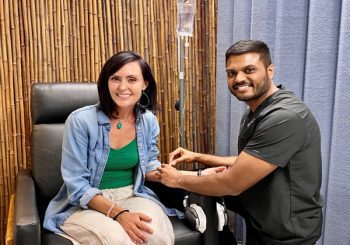 By Kaia Roman
By Kaia Roman
Guest writer for Wake Up World
I’ve written about my quest to quell anxiety a lot over the years, including in my book, The Joy Plan. And thankfully, I have found many daily practices that help, such as mindfulness, meditation, exercise, healthy diet, and getting enough sleep.
But in recent months, it wasn’t enough. When family challenges sent my negative mental feedback loop into overdrive, I found myself unable to sleep, focus, or even think clearly (which happens when the amygdala is overactive). I was desperate to find the “off” switch.
Ketamine Therapy, Really?
Enter my friend Mike “Zappy” Zapolin. This guy is a futurist who describes himself as an “Internal Engineer.” He predicted and made millions from the rise of the internet, had his own Super Bowl commercial, consulted for the cannabis industry for years in preparation for legalization, and directed an incredible documentary film about ancient wisdom and plant medicine called The Reality of Truth.
Zappy has his finger on the pulse of high-tech innovations, cutting edge science, and up-and-coming health trends. Plus, he beams with joy and health as if he’s literally glowing from the inside. Five minutes with Zappy leaves you thinking, “I’ll have what he’s having.” Playboy Magazine called him “The Man Who Wants to Change the World with Psychedelics.”
When I told my friend about my recent struggles with anxiety, he had one word for me, and it definitely wasn’t a word I was expecting: ketamine. A few immediate thoughts came to my mind: “Isn’t that a party drug?” “Ketamine sounds like ‘amphetamine’ – that can’t be good.” And, “Wait, ketamine is a horse tranquilizer – why would I use that?”
Zappy explained that ketamine treatments are not to be confused with the club drug known as “Special K,” a crystallized form of ketamine that is snorted through the nose. “There are no beneficial effects that way,” he said. Ketamine is also, obviously, not used at horse tranquilizer levels for the kind of treatment he was talking about. I had a lot to learn about this medicine.
The Ketamine Fund
Zappy told me about the non-profit foundation he started with film producer Warren Gumpel, The Ketamine Fund. They’ve been donating treatments to veterans who are struggling with PTSD. In the US, 17 veterans commit suicide every day. The Ketamine Fund is on a mission to reduce suicide rates by 75%. So far, they’re seeing incredible results.
“These veterans came in suicidal; they were the worst-case scenario, then they have the ketamine and it just cleans their slate. One guy was on 22 medications from the VA, and now he’s on no medications—he’s just doing his regular monthly boosters with the ketamine,” said Zappy.
I couldn’t help but wonder, if ketamine can help veterans who’ve experienced such intense traumas – and bring them back from the brink of suicide to enjoying life – what could it do for me?
A Brief History of Ketamine
Although it’s still fairly unknown as a treatment for depression and anxiety, ketamine is not a new medicine. Calvin Stevens first synthesized the organic compound in 1962 and it was approved by the FDA in 1970. In fact, because it’s so safe, ketamine is one of the most common anesthetics in the world.
During the Vietnam War, ketamine was often used as emergency anesthesia for surgery in the battlefield. Doctors noticed that soldiers were having limbs amputated while laughing and talking about feeling connected to God. Those who received ketamine in surgery during Vietnam also had lower rates of PTSD.
Researchers later found that due to ketamine’s dissociative properties, at a low dose, the drug primes the brain for a complete rewiring of neural pathways. This makes it an excellent treatment for depression, anxiety, PTSD, addiction, and any other mental habit the patient wants to break.
In clinical trials since 2000, ketamine has showed improvement in 70-80% of patients who are treated for depression. In fact, The American Psychiatric Association (APA) reports “compelling evidence that the antidepressant effects of ketamine infusion are both rapid and robust.”
My Ketamine Road
Coming from the “Just Say No to Drugs” era, I’m automatically opposed to injecting anything in my arm. The whole concept feels strange, chemical, and far removed from an enlightening or personal growth experience. Given my hesitation and skepticism, Zappy suggested I visit My Ketamine Road in Miami.
Led by Dr. Kazi Zayn Hassan, MD, this ketamine clinic feels like a holistic health spa. My Ketamine Road opened in April 2019 and is already busy counselling patients during the day and treating them with ketamine in the evenings and on weekends when Dr. Hassan isn’t working his regular shifts at Jackson Health System in Miami.
While ketamine is not classified as a hallucinogenic, it is a psychedelic (substance capable of producing profound experiences of reality). A high dose puts you to sleep, but at a low dose, you enter a dreamlike state characterized by colorful visuals, a feeling of euphoria, and the ability to mentally examine any troubling subjects in your life from a new and expanded perspective.
While some doctors consider the psychedelic effect of ketamine to be an unwanted side effect, Dr. Hassan targets what he calls “non-ordinary states of consciousness.” Used with the right intention, ketamine can produce a short, intensive, transformational experience. This was definitely the case for me.
My Ketamine Experience
The ideal treatment protocol for depression, based on several studies at Yale, is a series of six infusions over two weeks. Since I don’t have clinical depression, but do struggle with anxiety, I decided to go for four infusions over two weeks.
Dr. Hassan explained to me that the mindset going into the treatment, clinic setting, and rapport with the provider all make a big difference to the experience. At My Ketamine Road, the experience couldn’t be better. The treatment takes place in a comfortable reclining chair, covered by a cozy blanket, while relaxing music plays in headphones and gentle aromatherapy scents waft through the air.
Dr Hassan and the clinic’s Director of Communications, Kabir Ali, are the most caring practitioners I can imagine, obviously deeply invested in supporting patients to have the best outcome possible. Throughout the treatment, Dr. Hassan checked my blood pressure and asked me how I was doing. I felt safe, comfortable, and very much at peace.
The experience itself felt like a journey through my own mind, where I encountered beautiful visuals and was able to access difficult areas of my life from a new angle. I was simultaneously fully aware and fully immersed during the one-hour-long infusion.
The sensation was as if I was floating outside my body, leaving my habitual state of mind behind, and opening myself to new possibilities. After the infusion, I was left with a beautiful, calm feeling and felt so present that I could have gone back to work 15 minutes later.
With each treatment, I experienced new levels of clarity, energy, and excitement. The results increased in the days and weeks that followed. I felt more peace, experienced deeper sleep, and found I was seeing things in a new way, feeling less stuck. I can only imagine what an immense this relief this would be for someone with severe depression or PTSD.
Ketamine-Assisted Therapy
My Ketamine Road has been tracking their results since day one, with very good clinical outcomes so far: 70 to 80% of people respond within hours, and the protocol of six infusions has a success rate in the ninetieth percentile and up. However, Dr. Hassan feels that the most successful ketamine treatment is combined with counseling.
“Ketamine is a tool to go inside the mind and change programming and habits during an altered state of consciousness,” Dr. Hassan explained. “Ultimately the goal is for this medicine to be used as a tool for personal transformation, not as a crutch or to escape from life.”
The 24-hour window after a ketamine infusion is when the brain undergoes major neurogenesis, creating new neural pathways which make it easier to create new ways of thinking. This window of opportunity is when counseling can be most effective.
My Ketamine Road offers ketamine-assisted psychotherapy, i.e., patients actually speak with a therapist while receiving a low dose infusion. During this process, patients can access deep memories, process past traumas, and gain new insights much more easily than without the medical boost.
The Ideal Catalyst
Dr. Carolina Pataky, Ketamine Assisted Therapist and Cofounder of the Love Discovery Institute, is an experienced psychedelic integration therapist – a specialty that’s gaining popularity as more people turn to psychedelics for personal growth work. The fact that Michael Pollan’s latest book on the subject, How to Change Your Mind, reached number one on the New York Times nonfiction bestseller list shows that interest in the healing power of psychedelic catalysts is on the rise.
Although Dr. Pataky has extensive practice helping patients integrate experiences they’ve had with psilocybin, ayahuasca, and MDMA, she says ketamine is the easiest for her clients to work with because, “they can actually talk during their psychedelic experience.”
“Ketamine is currently the only legal psychedelic. You can have a coherent conversation during a treatment and it can be regulated. This makes it an ideal component to therapy,” Dr. Pataky told me – particularly when it comes to trauma.
“After trauma, it’s common to disassociate from yourself. With ketamine, you go into the trauma, talk about it, change the perception of it, and come to terms with it so it doesn’t come up all the time, trapping you,” Dr. Pataky explained.
This treatment doesn’t only to apply to those who’ve experienced severe traumas, such as those that many veterans have survived. “Most people carry some level of PTSD from something in their lives, usually in the first eight years of life,” she said.
Ketamine for Addiction
For Kabir Ali, My Ketamine Road’s warm and friendly Communications Director, working with Dr. Pataky in conjunction with ketamine infusions ended his severe cocaine addiction. Kabir considers his first ketamine infusion to be the first day of his new life.
“I was reborn. I saw what my trajectory would be if I continued with my addiction, and I can honestly say that ketamine saved my life,” he said. Following four infusions, it was the fifth treatment with ketamine-assisted therapy that provided the breakthrough moment that broke Kabir’s addiction.
“I had amazing clarity,” Kabir explained. “With ketamine-assisted therapy, the walls are down, the storyteller leaves the room, and you can be completely honest and clear.” Kabir is now an advocate for other addicts and he’s seen great breakthroughs for those who go through the treatment program.
Ketamine for Depression and Suicide Prevention
Like Kabir, it seems that once someone experiences the incredible benefits of this treatment, they become an instant spokesperson for it. That was definitely the case for Warren Gumpel, Cofounder of The Ketamine Fund. Warren suffered from severe depression since he was a teenager. After trying every available medication, and enduring terrible side effects, he was still thinking about suicide constantly.
“I had no drive to do anything, not even shower or get out of bed. Suicide was my safe place. At least I knew there was a way out of my suffering if I killed myself,” Warren told me.
In 2016, just before Warren enrolled in shock therapy, his psychopharmacologist suggested he give ketamine a try. Warren’s first treatment was in a small room in a podiatrist office, under harsh fluorescent lights – a far cry from my deluxe experience at My Ketamine Road. But it still produced remarkable results.
After more than 20 years of daily suicidal ideation, Warren’s depression lifted after four treatments. “Ketamine brought me back to life. After the first infusion, I couldn’t even conjure the thoughts of suicide anymore.”
Warren explained to me that brain firing patterns are disordered in depression, and ketamine restores them. “The mechanism for major depressive disorder is a region in the brain that records all the stress you’ve had in your life, called the lateral habenula. When this gets to a certain tipping point, it goes into a ‘burst’ mode and shuts down the ventral tegmental area, which is responsible for dopamine production.”
“So, you’re not getting dopamine anymore, nothing is making you happy, and you’re depressed all the time,” Warren explained. “Ketamine is a like a light switch that turns the ventral tegmental area and dopamine production back on.”
“Ketamine then metabolizes into 6-hydroxynorketamine in the hours after the treatment, which builds new neural pathways in the brain. We see people walk in after decades of severe depression and come out feeling love and gratitude for their life.”
The Ketamine Crusaders and Lamar Odom’s Ketamine Story
Along with my friend Zappy, Warren has now dedicated his life to helping others get relief.
“When I’ve been in that place that I was in and I know that there’s a solution, what else would I do but spread the word about this?” Warren explained.
The goal of The Ketamine Fund is to make ketamine available and affordable for everyone who could benefit from it, starting with veterans. “Veterans are amazing people – they care about others and have a sense of responsibility to protect and serve for the greater good. These are not people we want to take out of society through PTSD, depression, and suicide,” said Warren.
Zappy and Warren’s upcoming documentary about Lamar Odom, Lamar Odom/Reborn, will open people’s eyes to the power of this medicine. I had an opportunity to see a pre-screening of the film while I was visiting Miami for ketamine treatment. Watching the basketball superstar transform his life from the heavy addiction and depression which almost killed him to being happy, healthy, and thriving is inspiring.
Life After Ketamine
One surprising benefit I’ve experienced in the weeks following my treatment is that I am able to slip into deeper meditation more easily. Dr. Hassan explained why that might be the case.
“Ketamine may lower the activity of a brain area called the Default Mode Network, which is linked to rumination and a wandering mind. This can open up experiences of deep meditation to people who otherwise typically struggle to quiet their minds,” he told me.
Of course, ketamine is not a panacea or miracle cure. Warren still gets a booster infusion a few times a year to keep his depression in check. But, he’s happy to be off all other medication and, like many people who turned to ketamine as a last resort, his life has completely transformed.
“It’s absurd that ketamine is not the first treatment for depression,” said Warren. “It works better than SSRIs with almost no side effects. Everyone should know that this is an option.”
After experiencing ketamine infusions for myself, I must say that I agree. Everyone should know that this is an option.
About the author:
Kaia Roman is the author of the memoir, The Joy Plan. She teaches Mindfulness to elementary school students and is a blogger for mindbodygreen and other sites. She’s also a communications consultant to some of Silicon Valley’s largest companies. She writes about how she went from joyless and anxious to grateful and optimistic so she can remember how she did it if she forgets. You’ll find her on Facebook, Twitter, Instagram, and TheJoyPlan.com.

If you've ever found value in our articles, we'd greatly appreciate your support by purchasing Mindful Meditation Techniques for Kids - A Practical Guide for Adults to Empower Kids with the Gift of Inner Peace and Resilience for Life.
In the spirit of mindfulness, we encourage you to choose the paperback version. Delve into its pages away from screen glare and notifications, allowing yourself to fully immerse in the transformative practices within. The physical book enriches the learning process and serves as a tangible commitment to mindfulness, easily shared among family and friends.
Over the past few years, Wake Up World has faced significant online censorship, impacting our financial ability to stay online. Instead of soliciting donations, we're exploring win-win solutions with our readers to remain financially viable. Moving into book publishing, we hope to secure ongoing funds to continue our mission. With over 8,500 articles published in the past 13 years, we are committed to keeping our content free and accessible to everyone, without resorting to a paywall.






